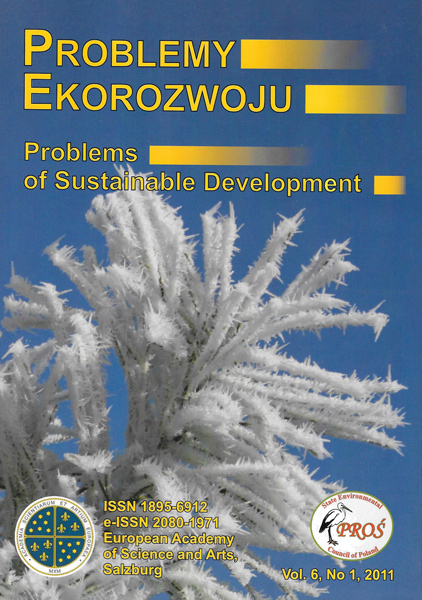Low Carbon Growth: An Indian Perspective on Sustainability and Technology Transfer
Article Sidebar
Issue Vol. 6 No. 1 (2011)
-
Ecophilosophy in Problems of Sustainable Development Journal
Zbigniew Hull7-10
-
The Deep Roots of Sustainability
Eva M. Kras11-30
-
Environmentally Sustainable National Income and Other Ways to Improve Information About Growth
Roefie Hueting31-46
-
The Golden Rule and Sustainable Development
Gerhard Zecha47-58
-
Sustainability and Global Role of Heavy Metals
Lucjan Pawłowski59-64
-
Low Carbon Growth: An Indian Perspective on Sustainability and Technology Transfer
Purnamita Dasgupta, Nisha Taneja65-74
-
Green Economy Idea – Limits, Perspectives, Implications
Sławomir Gurtowski75-82
-
Society “Possessed by Ecology” is it a Threat to Human Freedom and Democracy?
Zdzisława Piątek83-94
-
The Eco-philosophical Breakthrough: Zdzisława Piątek’s Concept
Ignacy S. Fiut95-106
-
The Implementation of Sustainable Development
Andrzej Papuziński107-116
-
The Ecology of Space
Wiesław Sztumski117-138
-
House Martin Delichon Urbicum Case Study as a Reason to Consider the Need of Retardation of Processing of Natural Re-sources and Protection of Ecosystems’ Services
Joanna Kostecka139-144
-
The Concept of Sustainable Development in Tourism
Urszula Myga-Piątek145-154
-
Book Review: W. Bołoz, Kościół i ekologia. W obronie człowieka i środowiska naturalnego, Wyd. Homo Dei, Kraków 2010
Karolina Smoderek155-156
-
Letter to the Editorial Office: Jubilee Conference Dedicated to prof. Józef Dołęga, Cardinal Stefan Wyszynski University in Warsaw, May 4th 2010
Dominika Dzwonkowska, Michał Latawiec157-158
-
Letter to the Editorial Board: Development Or Destruction of the World’s Society?
Włodzimierz W. Bojarski158-162
-
Letter to the Editorial Office: How to Shape Conciseness for Ecology and Sustainable Development?
Wiesław Sztumski162-166
-
Communiques of the State Environmental Council of Poland
Tomasz Winnicki167-178
Archives
-
Vol. 8 No. 2
2013-07-01 13
-
Vol. 8 No. 1
2013-01-02 12
-
Vol. 7 No. 2
2012-07-02 14
-
Vol. 7 No. 1
2012-01-02 12
-
Vol. 6 No. 2
2011-07-01 19
-
Vol. 6 No. 1
2011-01-03 18
-
Vol. 5 No. 2
2010-07-01 21
-
Vol. 5 No. 1
2010-01-04 16
-
Vol. 4 No. 2
2009-07-01 19
-
Vol. 4 No. 1
2009-01-05 22
Main Article Content
Authors
Abstract
This paper provides an Indian perspective on the issue of technology transfer, in the specific context of tackling climate change. The paper examines how technology transfer issues have panned out when developing countries have had to meet standards laid down in international agreements. In addressing climate change, the efficacy of the CDM as an instrument to facilitate technology transfer is analysed. The socio-political and economic analysis of implementing the clean development mechanism provides useful insights. An indicative exercise on India’s export vulnerability in the face of alternative regulatory regimes such as imposition of carbon tariffs demonstrates the importance of technology transfer mechanisms between the developed and developing countries. The attainment of sustainable development through forward looking mechanisms of technology transfer will improve India’s contribution to a global solution for climate change.
Keywords:
References
AMRICAN Clean Energy and Security Act 2009 (Waxman-Markey Bill 2009), http://www.opencongress.org/bill/111-h2454/show.
DASGUPTA, P., Economics and Climate Change: Some Relevant Aspects for Human Security in India, in: Security Challenges and Implications of Climate Change for India, IDSA, Academic Foundation, Delhi 2009.
DASGUPTA, P., TANEJA, N., 2010, Trade, Technology Transfer and Climate Change, in: Economic and Political Weekly, Volume XLV No. 3, January p. 16-22.
ELLIS, J., MORAIF, S., KIM J.A., Reporting And Recording Post-2012 GHG Mitigation Commitments, Actions and Support, No.COM/ ENV/EPOC/IEA/SLT(2009)4, OECD 2009.
GERMAIN, M.., MAGNUS, A., VAN STEENBERGHE, V., 2007, How to design and use the clean development mechanism under the Kyoto Protocol? A developing country perspective, in: Environmental and Resource Economics, Vol. 38, Number 1, September.
GOVERNMENT of India Submission to UNFCCC on Technology Transfer Mechanism, http://unfccc.int/files/kyoto_protocol/application/pdf/indiatechtransfer171008.pdf.
LETTER TO UNFCCC regarding listing in the Chapeau to the Copenhagen Accord, March 8, 2010, Government of India, http://unfccc.int/files/meetings/application/pdf/indiacphaccord.pdf.
MoEF, India’s GHG Emissions Profile - Results of five climate modeling studies, Ministry of Environment and Forests, Government of India, September 2009, http://www.moef.nic.in.
MoEF, India’s Submission to the UNFCCC, Ministry of Environment and Forests, Government of India, August 2009, http://www.moef.nic.in/downloads/home/UNFCCC-final.pdf.
NARAIN, U., VAN’T VELD, K., 2008, The Clean Development Mechanism’s Low-hanging Fruit Problem: When Might it Arise, and How Might it be Solved?, in: Environmental and Resource Economics, Vol. 40, Number 3, July.
RAMESH S.J., Remarks of the Minister of State (Independent Charge) Environment and Forests, Government of India at the 6th MEF meeting, Washington D. C., April 18th, 2010. Communication from MoEF, GOI.
REPORT, Report of the Conference of the Parties on its fifteenth session, held in Copenhagen from 7 to 19 December 2009, Addendum, Part Two: Action taken by the Conference of the Parties at its fifteenth session, Advance version, 30 march 2010. http://unfccc.int/resource/docs/2009/cop15/eng/11a01.pdf.
SAQIB, M., SEHGAL, R., PAMLIN. D., Indian Companies in the 21st Century, WWF, Delhi 2009.
SERES, S., Analysis of Technology Transfer in CDM projects, UNFCCC 2008.
SUBRAMANIAN, A., BIRDSALL, N., MATTOO, A., 2009, India and Climate Change: Some International Dimensions, in: Economic and Political Weekly, Vol. 44 No. 31 August.
THE Copenhagen Accord, http://unfccc.int/home/items/5262.php.
UNFCCC, Clean Development Mechanism: 2008 In brief, United Nations Framework Convention on Climate Change, 2008, http://unfccc.int/resource/docs/publications/08_cdm_in_brief.pdf.
UNFCCC The Marrakesh Accords and the Marrakesh Decleration, http://unfccc.int/cop7/documents/accords_draft.pdf.
UNFCCC, United Nations Framework Convention on Climate Change, http://cdm.unfccc. int/Statistics/index.html.
WORLD BANK, Clean Development Mechanism projects in India, The World Bank, http://search.worldbank.org/projects?qterm=clean+development+mechanism&_ctry_exact=Republic+of+India
WTO-UNEP, Trade and Climate Change, World Trade Organisation and United Nations Environment Programme, Geneva 2009.
Article Details
Abstract views: 88
License

This work is licensed under a Creative Commons Attribution-ShareAlike 4.0 International License.


